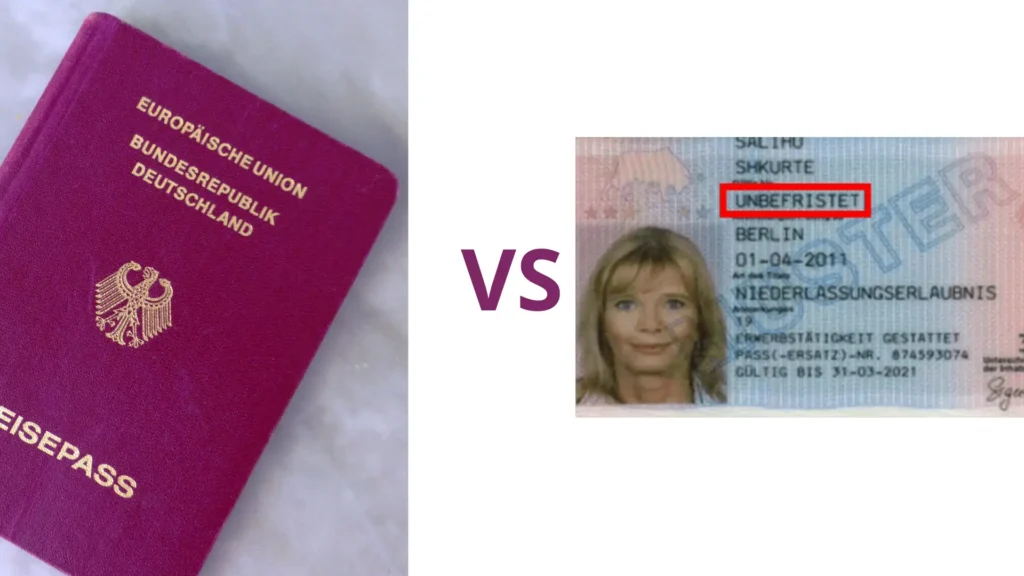German Citizenship vs UK Citizenship: Which is Right for You? Are you considering obtaining a second passport or relocating to Europe? How do the benefits of German citizenship compare to those of UK citizenship? What are the key differences in terms of visa-free travel, rights within the European Union, and post-Brexit implications? Is one passport more powerful than the other, and how do their residency requirements, tax policies, and social benefits stack up? In this article, we’ll explore these questions to help you make an informed decision between German citizenship and UK citizenship.
Pathways to Citizenship
German Citizenship
Germany offers several routes to citizenship:
- Birth: Children born to at least one German parent automatically receive German citizenship.
- Naturalization: After 5 years of legal residence in Germany, individuals can apply for citizenship.
- Marriage: Spouses of German citizens can apply for citizenship after 3 years of marriage and 2 years of residence in Germany.
UK Citizenship
The UK also provides multiple paths to citizenship:
- Birth: Children born in the UK to at least one British parent or settled resident are automatically British citizens.
- Naturalization: After 5 years of residence in the UK (or 3 years if married to a British citizen), individuals can apply for citizenship.
- Ancestry: Those with a UK-born grandparent may be eligible for citizenship.
Language Requirements
Both countries place importance on language proficiency for citizenship applicants.
Germany
Applicants for German citizenship must demonstrate proficiency in the German language. This typically means passing the B1 level of the Common European Framework of Reference for Languages (CEFR).
United Kingdom
For UK citizenship, applicants need to pass the “Life in the UK” test and demonstrate English language proficiency at B1 CEFR level or higher.
Dual Citizenship Policies
Germany
Historically, Germany has been strict about dual citizenship. However, recent changes have made it more flexible:
- EU citizens and Swiss nationals can hold dual citizenship.
- Children born to German parents abroad can hold dual citizenship.
- In some cases, non-EU citizens may retain their original citizenship when naturalizing as German.
United Kingdom
The UK has a more lenient approach to dual citizenship:
- British citizens can hold dual citizenship without restriction.
- Naturalizing citizens are not required to renounce their original citizenship.
Rights and Benefits
Both German and UK citizenship offer a range of rights and benefits. Let’s compare some key aspects:
| Category | Germany | UK |
|---|---|---|
| Years for Naturalization | 5 years | 5 years |
| Language Proficiency | B1 level (CEFR) | B1 level (CEFR) |
| Dual Citizenship Flexibility | Allowed (new Law) | Allowed |
| EU Freedom of Movement | Yes | No (post-Brexit) |
| Visa-free Travel (countries) | 191 (2023 status) | 185 (2023 status) |
| Social Benefits | Comprehensive | Comprehensive |
| Education Costs | Free public universities | Subsidized, with tuition fees |
Economic Considerations
When comparing German and UK citizenship, it’s essential to consider the economic landscape of both countries.
Germany
As Europe’s largest economy, Germany offers:
- Strong manufacturing sector
- Emphasis on renewable energy and technology
- Low unemployment rates
- Strong social welfare system
United Kingdom
The UK, with its service-oriented economy, provides:
- Global financial hub (London)
- Strong creative and tech industries
- Flexible labor market
- Competitive business environment
Both countries offer excellent opportunities, but in different sectors. Your career goals and industry preferences may influence your citizenship decision.
Education Systems
The quality of education is often a crucial factor for those considering citizenship, especially for families.
Germany
- Free public education, including universities
- Dual education system combining classroom learning with apprenticeships
- Strong emphasis on vocational training
United Kingdom
- Free public education up to age 18
- World-renowned universities (though with tuition fees)
- Strong international student community
Both systems have their strengths, with Germany’s focus on practical skills and the UK’s emphasis on academic excellence.
Healthcare Systems
Access to quality healthcare is a significant benefit of citizenship in both countries.
Germany
Germany’s healthcare system is known for:
- Universal coverage through statutory health insurance
- Option for private insurance
- Short waiting times for treatments
- High-quality medical facilities
United Kingdom
The UK’s National Health Service (NHS) offers:
- Free healthcare at the point of use
- Comprehensive coverage
- Strong general practitioner (GP) system
- Challenges with waiting times for some treatments
Both systems provide excellent care, but with different approaches to funding and service delivery.
Cultural Integration
Becoming a citizen involves more than just legal status; it’s about integrating into the culture and society of your new home.
Germany
- Strong emphasis on learning the German language
- Rich cultural heritage with regional variations
- Growing multicultural society, especially in urban areas
- Value placed on punctuality and directness
United Kingdom
- Diverse, multicultural society, particularly in major cities
- English language dominance makes initial integration easier for many
- Strong pub and social culture
- Emphasis on politeness and indirect communication
Both countries offer unique cultural experiences and have become increasingly diverse in recent decades.
Political Participation
Citizenship grants you the right to fully participate in the political process of your chosen country.
Germany
- Federal system with strong regional governments. (Explore more about the German Political system)
- Proportional representation voting system
- Multiple political parties with coalition governments common
United Kingdom
- Parliamentary democracy with first-past-the-post voting system
- Devolved governments in Scotland, Wales, and Northern Ireland
- Two dominant political parties, though smaller parties play significant roles
Your political views and preferred system of governance might influence your citizenship choice.
Global Perception and Influence
The passport you hold can affect how you’re perceived internationally and the influence your country wields on the global stage.
Germany
- Viewed as a leader in the European Union
- Known for engineering excellence and economic stability
- Influential in EU policy-making
United Kingdom
- Permanent member of the UN Security Council
- Strong diplomatic ties with many countries, including the Commonwealth
- Influential in global finance and culture
Both passports are highly regarded internationally, offering excellent visa-free travel options.
Future Outlook
When considering German Citizenship vs UK Citizenship, it’s important to think about the future prospects of each country.
Germany
- Continued leadership in renewable energy and industry 4.0
- Challenges with an aging population
- Potential for further European integration
United Kingdom
- Adapting to post-Brexit realities
- Focus on developing new trade relationships globally
- Continued strength in finance and technology sectors
Both countries face challenges and opportunities in the coming years, which could impact the value of citizenship.
Making Your Decision
Choosing between German and UK citizenship is a deeply personal decision that depends on various factors:
- Your long-term career goals
- Family considerations
- Cultural preferences
- Language abilities
- Political and economic outlook
- Personal ties to either country
It’s essential to research thoroughly, possibly visit both countries, and consider seeking legal advice before making your decision.
Remember, citizenship is not just about the benefits and rights it confers, but also about the responsibilities and commitment to your new home country. Whether you choose German or UK citizenship, you’ll be embarking on an exciting new chapter in your life, with unique opportunities and experiences awaiting you.
Whichever path you choose, both Germany and the UK offer stable, prosperous environments with rich cultures and histories. Your active participation as a citizen will not only benefit you but also contribute to the ongoing story of your chosen nation.




